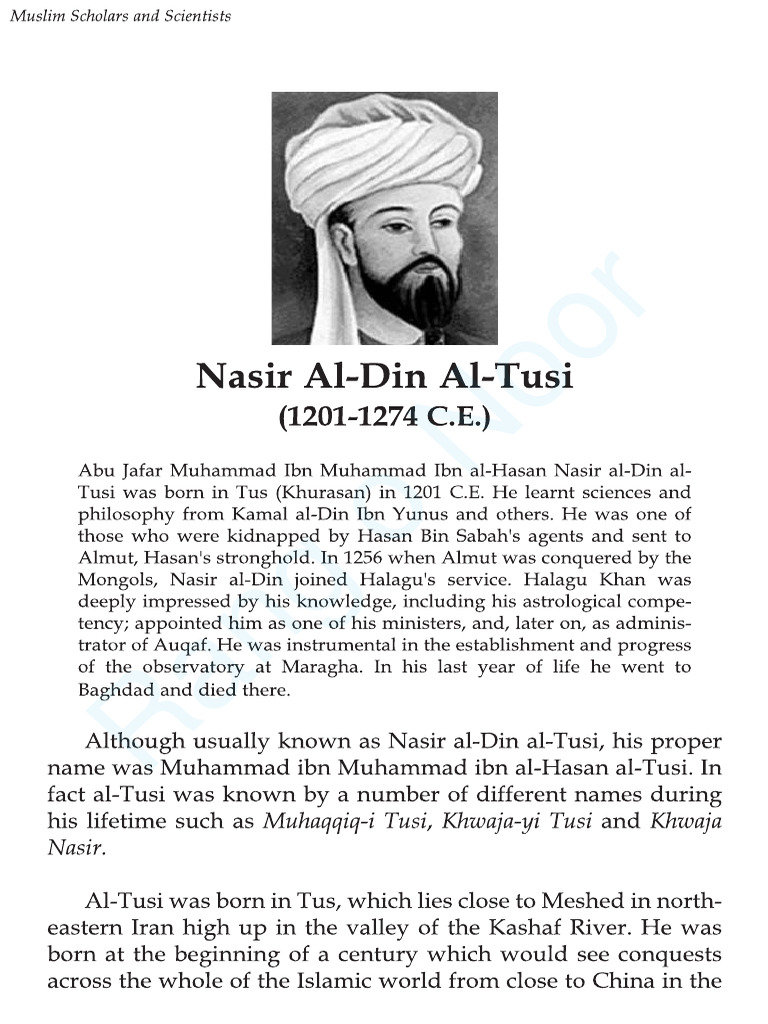In the rich tapestry of Islamic intellectual tradition, the eminent scholar Nasir al-Din al-Tusi emerges as a beacon of enlightenment, illuminating the paths of Shia teachings with his profound insights. His contributions traverse the chasms of theology, philosophy, and science, harmonizing disparate fields into a cohesive narrative that resonates with the essence of Shia thought. This article delves into the unique appeal of al-Tusi’s teachings, emphasizing the intricate interplay between his philosophical acumen and Shia doctrine.
Born in 1201 in Tus, Iran, al-Tusi was no ordinary scholar. He is often regarded as a polymath, a figure whose intellect traversed the realms of logic, astronomy, mathematics, and ethics. Within the Shia tradition, his works are not merely academic exercises; they are the keystones that bolster the theological edifice of Shia Islam. His magnum opus, “Tahrir al-Maqal,” epitomizes his approach to synthesizing rational thought with faith, heralding an era where skepticism and devotion could coalesce.
One of the most intriguing aspects of al-Tusi's philosophy is his notion of the 'unity of being' (wahdat al-wujud). This concept underlines the belief that all existence emanates from a singular reality—the divine essence. It posits that multiplicity in the world is an illusion, much like a hall of mirrors reflecting one underlying truth. Such a perspective is particularly appealing in Shia Islam, as it reinforces the idea of divine guidance manifesting through the Imams, who serve as both spiritual leaders and exemplars of this singular essence. Thus, adherents are encouraged to navigate the complexities of life through the lens of a unified divine purpose.
Moreover, al-Tusi’s engagement with the rational sciences was groundbreaking. In an era often deemed the 'dark ages' for scientific inquiry, he championed empirical observation and mathematical rigor. His astronomical treatise, “Zij,” not only corrected Ptolemaic inaccuracies but also advanced methods of calculating planetary movements that are foundational in the field. This amalgamation of science and faith challenges the narrative that religion and rationality stand in opposition; instead, it illustrates how they can coexist harmoniously within a Shia framework.
Al-Tusi’s intellectual rigor is complemented by his ethical teachings, which find roots in the Shia emphasis on moral integrity and social justice. He articulated a vision of ethics that transcends mere legalism, advocating for a comprehensive moral philosophy that engages with the complexities of human interaction. His perspective on justice, particularly, carries a metaphysical dimension, suggesting that true justice reflects divine attributes. This assertion resonates deeply within Shia teachings, which prioritize justice as a manifestation of divine will on Earth.
Moreover, al-Tusi’s role as a jurist (faqih) cannot be overstated. He meticulously navigated the intricacies of Islamic jurisprudence, offering interpretations that reflect the evolving dynamics of society. His contributions to the field ensured that Shia jurisprudence remained robust and adaptable, capable of addressing contemporary issues while remaining steadfastly rooted in tradition. This adaptability is crucial in Shia thought, as it aligns with the belief in the necessity of religious guidance in all facets of life, echoing the Imams' teachings in every age.
Al-Tusi's life was embroiled in the turbulent political landscape of the 13th century, marked by the Mongol invasions and ensuing chaos. Yet, he emerged not as a victim of circumstance but as a figure of resilience, channeling adversity into scholarly pursuits. His experience serves as a metaphorical allegory; just as a seed germinates through the darkest of soils, al-Tusi's intellect flourished amid turmoil, thus inspiring future generations to seek knowledge unwaveringly, regardless of external strife.
Another remarkable aspect of al-Tusi’s legacy is his role in the establishment of institutions of learning. His contributions to the founding of the Naṣiriyya madrasah in 1258 signify a general commitment to cultivating a fertile environment for scholarship and discourse. These institutions not only preserved the teachings of the Shia tradition but also promoted a culture of intellectual inquiry and ethical debate, embodying the belief that knowledge is a sacred pursuit.
In examining the pedagogical methods employed by al-Tusi, one notes a deep reverence for dialogue and critical thinking. He championed a method of teaching that was not necessarily didactic; rather, it sought to engage students in a dialectical process, encouraging them to explore and question. This educational philosophy dovetails perfectly with Shia teachings, which advocate for the active engagement of the faithful in the pursuit of truth. Al-Tusi's approach promotes both personal and communal growth, emphasizing that the journey toward understanding is as significant as the knowledge itself.
Ultimately, the salient teachings of Nasir al-Din al-Tusi encapsulate a profound synthesis of intellect and spirituality. His works continue to resonate, bridging the chasm between faith and reason, thus affirming a distinctly Shia identity that values wisdom, ethics, and social justice. Engaging with al-Tusi's legacy offers not just insight into the Shia tradition but also a template for navigating the complexities of modern existence through an unwavering commitment to knowledge and divine truth.
As we explore the multifaceted teachings of Nasir al-Din al-Tusi, we are invited to reflect on our journey through the corridors of inquiry. His poignant metaphors and incisive analyses serve as guiding stars, illuminating our paths as we delve into the depths of Shia thought and the broader Islamic heritage, paving the way for an enriching understanding of faith that transcends generations.


